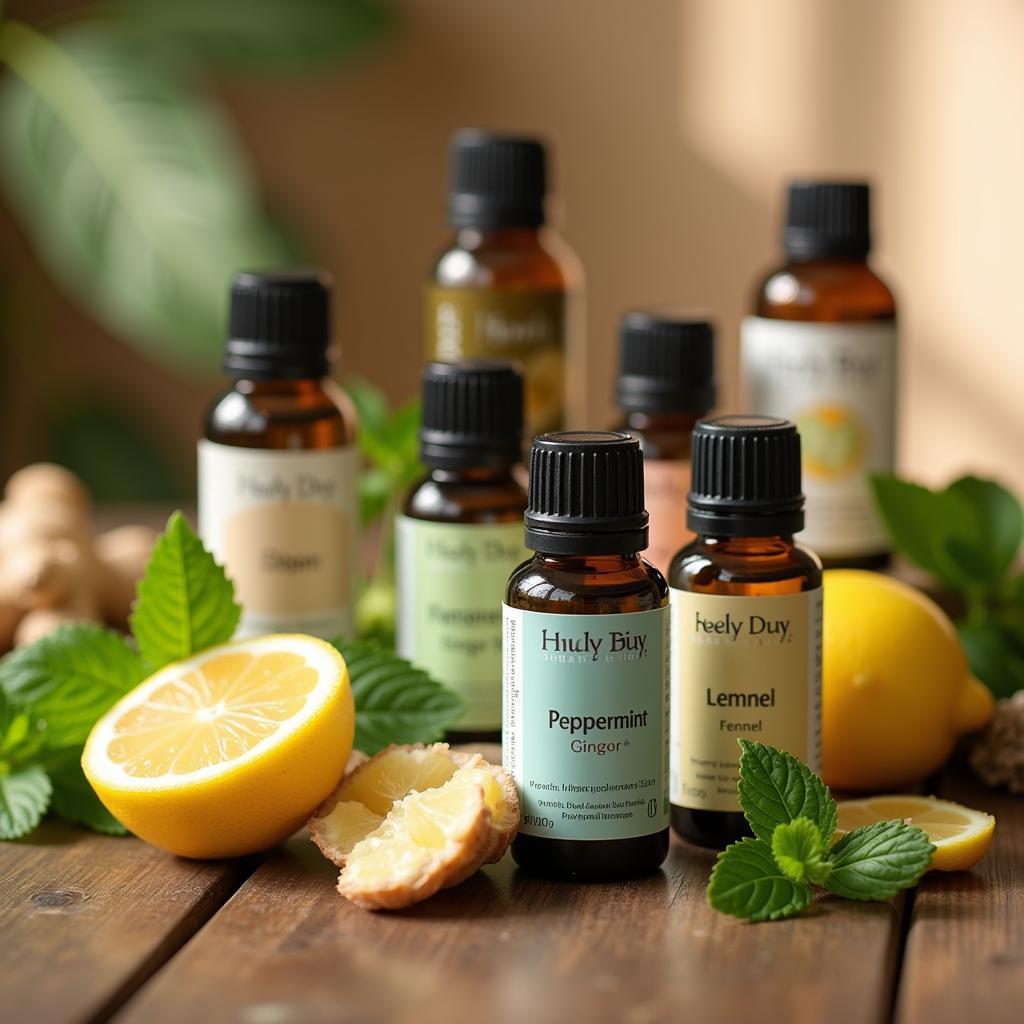Food poisoning is a common, unpleasant experience often marked by nausea, vomiting, and diarrhea. While conventional treatments exist, many people seek natural remedies to alleviate symptoms. Essential Oils For Food Poisoning have gained popularity as a potential complementary approach. This article explores the potential benefits and usage of essential oils in managing food poisoning discomfort.
Understanding Food Poisoning and the Role of Essential Oils
Food poisoning occurs when you consume contaminated food or drinks. Bacteria, viruses, and parasites are the usual culprits. Symptoms can range from mild to severe and may require medical attention. While essential oils can’t cure food poisoning, some may offer relief from specific symptoms. It’s crucial to remember that essential oils should complement, not replace, medical advice and treatment. Always consult with a healthcare professional, especially if symptoms are severe or persistent.
Effective Essential Oils for Food Poisoning Symptoms
Several essential oils have shown promise in easing food poisoning symptoms. These include:
- Peppermint Oil: Known for its soothing properties, peppermint oil may help reduce nausea and vomiting.
- Ginger Oil: Ginger has long been used to alleviate digestive issues. Ginger oil may help reduce nausea and bloating.
- Lemon Oil: With its antibacterial properties, lemon oil can potentially combat the bacteria causing food poisoning and help with digestion.
- Fennel Oil: This oil is known for its antispasmodic effects, which can help soothe stomach cramps and bloating.
 Essential Oils for Food Poisoning Relief
Essential Oils for Food Poisoning Relief
How to Use Essential Oils Safely
Essential oils are potent and should be used with caution. Here are some safety guidelines:
- Dilution: Always dilute essential oils with a carrier oil like coconut or almond oil before topical application. A general rule is 1-3 drops of essential oil per tablespoon of carrier oil.
- Ingestion: Only ingest essential oils that are specifically labeled for internal use and under the guidance of a healthcare professional.
- Patch Test: Before applying to a larger area, perform a patch test on a small area of skin to check for any allergic reactions.
- Children and Pregnant Women: Consult a healthcare professional before using essential oils on children or during pregnancy.
Other Natural Remedies for Food Poisoning
In addition to essential oils, several other natural remedies can help manage food poisoning symptoms:
- Hydration: Drinking plenty of fluids is crucial to prevent dehydration caused by vomiting and diarrhea.
- Rest: Adequate rest helps your body recover.
- BRAT Diet: The BRAT diet (bananas, rice, applesauce, and toast) is gentle on the stomach and can help solidify stools.
When to Seek Medical Attention
While natural remedies can provide relief, it’s important to seek medical attention if:
- Symptoms are severe and persistent.
- You experience signs of dehydration, such as dizziness and decreased urination.
- You have a high fever.
- You have bloody diarrhea or vomit.
“Incorporating essential oils into a holistic approach can be beneficial for managing mild food poisoning symptoms,” says Dr. Emily Carter, a Naturopathic Doctor specializing in integrative medicine. “However, it’s crucial to use them safely and consult a healthcare professional for personalized advice.”
Preventing Food Poisoning
Prevention is always better than cure. Follow these tips to minimize your risk:
- Wash your hands thoroughly before handling food.
- Cook food to the recommended internal temperature.
- Store food properly to prevent bacterial growth.
- Avoid consuming raw or undercooked meat, poultry, and seafood.
In conclusion, essential oils for food poisoning can offer potential relief from symptoms like nausea, vomiting, and cramping. However, they should be used responsibly and in conjunction with medical advice. Remember to prioritize hydration, rest, and a bland diet for recovery. By understanding the safe and effective use of essential oils, you can incorporate them into a holistic approach to managing food poisoning discomfort. For severe or persistent symptoms, always seek professional medical care.
FAQ
- Can essential oils cure food poisoning?
No, essential oils cannot cure food poisoning. They may offer symptomatic relief. - How do I dilute essential oils?
Dilute 1-3 drops of essential oil per tablespoon of carrier oil. - Can I ingest essential oils?
Only ingest oils labeled for internal use and under professional guidance. - When should I see a doctor for food poisoning?
Seek medical attention for severe symptoms, dehydration, high fever, or bloody stools. - Which essential oils are best for nausea?
Peppermint and ginger oils are commonly used for nausea relief. - Are essential oils safe for everyone?
Consult a doctor before using essential oils on children or during pregnancy. - What other natural remedies can I try?
Hydration, rest, and the BRAT diet can aid recovery.
Need further support? Contact us at Phone Number: 02437655121, Email: minacones@gmail.com Or visit our address: 3PGH+8R9, ĐT70A, thôn Trung, Bắc Từ Liêm, Hà Nội, Việt Nam. We have a 24/7 customer support team.